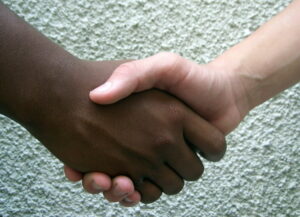
Passing the Peace and Pious Gestures
Passing the peace
When I was new to Anglican worship, one of the most jarring segments in the service was the sudden change of the flow after the prayers and confession of sin into the passing of the peace. For me, it seemed that we were taken from an otherwise beautiful, reverential, and sacred worship service and suddenly thrust into what felt like a glorified seventh-inning stretch so that we can shake hands with “Bob” and “Sally” (no offense meant to any Bob or Sally). I have heard the passing of the peace affectionately called “the stand and greet time” and “the Methodist mingle.” Why do we do this?
While the passing of the peace may seem like an afterthought or some modern invention added to an ancient, sacred liturgy, it is, in fact, one of the oldest parts of our liturgy. Liturgist Frank Senn says, “In the ancient church, this was the kiss of peace. Today in Western churches, worshippers typically shake hands…But it should be regarded as a solemn time in the liturgy, not a frivolous time for friendly conversation” (Introduction to Christian Liturgy, pg. 194). There are practical and theological purposes for the passing of the peace.
We first seek peace with God; we then seek peace with each other.
T he passing of the peace occurs immediately after the confession of our sin to God and the absolution declared by the priest. It is not a coincidence that we pass the peace directly after this time. We have just been made right with God. The peace is an opportunity to get right with our brothers and sisters. Historically, this time was an opportunity to seek peace or reconciliation with those we may have sinned against before coming to the communion table.
he passing of the peace occurs immediately after the confession of our sin to God and the absolution declared by the priest. It is not a coincidence that we pass the peace directly after this time. We have just been made right with God. The peace is an opportunity to get right with our brothers and sisters. Historically, this time was an opportunity to seek peace or reconciliation with those we may have sinned against before coming to the communion table.
Two passages of scripture come to mind. First, Jesus said in Matthew 5, “If you are offering your gift at the altar and there remember that your brother has something against you, leave your gift there before the altar and go. First, be reconciled to your brother, and then come and offer your gift.” While Jesus is not explicitly speaking of the Eucharist, the principle seems clear: before we approach the altar, we must do our best to have peace with our brothers and sisters in the Lord.
The second passage is more explicit. Paul warns the church in 1 Corinthians 11.17-34 that we are not to come to communion without examining our hearts and lives first. He specifically called out the Corinthians for the disunity. The Eucharist is not a meal eaten among enemies but with family. Therefore, the passing of the peace is not a nicety or passive gesture; it is a bold act of declaring our reconciliation as children of God.
We proclaim Christ’s peace within us.
 After absolving the congregation, the priest declares, “The Peace of the Lord be always with you.” The congregation responds, “And with your Spirit.” The old ‘79 prayerbook had the people respond, “And also with you.” However, the ’79 prayerbook missed the point. This is not a call and response. It is one whole and complete statement that the clergy and people share in stating. We are declaring we have peace in our spirit and body. We have complete “shalom” – to borrow from the Hebrew language.
After absolving the congregation, the priest declares, “The Peace of the Lord be always with you.” The congregation responds, “And with your Spirit.” The old ‘79 prayerbook had the people respond, “And also with you.” However, the ’79 prayerbook missed the point. This is not a call and response. It is one whole and complete statement that the clergy and people share in stating. We are declaring we have peace in our spirit and body. We have complete “shalom” – to borrow from the Hebrew language.
The theologian, Patrick Oden, points out in an article written for Fuller Seminary:
“The world says that if we do a certain thing, we will have peace—or identify in a certain way, and we will have peace. And maybe we will, for a moment. Then there’s something else after that, and onward we go away from true peace… In contrast to the peace of the world or the narrowed peace offered by a religious demographic, the peace Christ gives us in the Spirit is a transforming peace. This experience with peace is a beginning of liberation, a liberation of perceiving oneself entirely, seeing the self in the context of God’s self” (Passing the Peace: A Pneumatology of Shalom).
The peace we have is the peace we pass. Therefore, by passing the peace, we acknowledge that this supernatural, life-transforming, Christ-given, Holy Spirit-empowered peace is a reality within us. It is a testimony of God’s grace working within our lives.
It is an acknowledgment of our equality.
 We likely do not think of the peace as a bold act acknowledging our equality despite our racial, economic, and gender differences. However, the peace was a somewhat scandalous act for the ancient church. Again, looking at Paul in 1 Corinthians, we see the church struggled with divisions over these issues: the rich looked down upon the poor, Jews and Gentiles did not get along, and the role of women in the church was contentious. Passing the peace forced Christians from various backgrounds to come together. As Paul declared in Galatians, “There is neither Jew nor Gentile, neither slave nor free, nor is there male and female, for you are all one in Christ Jesus.” The peace places us into a posture of equality. We proclaim by shaking hands and hugging one another, “we are one in Christ.”
We likely do not think of the peace as a bold act acknowledging our equality despite our racial, economic, and gender differences. However, the peace was a somewhat scandalous act for the ancient church. Again, looking at Paul in 1 Corinthians, we see the church struggled with divisions over these issues: the rich looked down upon the poor, Jews and Gentiles did not get along, and the role of women in the church was contentious. Passing the peace forced Christians from various backgrounds to come together. As Paul declared in Galatians, “There is neither Jew nor Gentile, neither slave nor free, nor is there male and female, for you are all one in Christ Jesus.” The peace places us into a posture of equality. We proclaim by shaking hands and hugging one another, “we are one in Christ.”
Pious gestures
This discussion opens us up to a further conversation about pious gestures and posture. Many will notice that Anglican worship is a whole body, mind, and spirit experience. I remember the first time my sister-in-law attended an Anglican service. Afterward, she asked me, “What’s with all the bowing, kneeling, and crossing yourself?” It is a question Christians have often asked me outside our tradition. Many assume that Protestants protested against these “superstitious” acts. However, Luther, Calvin, and our own Thomas Cranmer did not seek to throw the baby out with the bathwater. They aimed to restore proper worship and saw liturgical worship as the starting place for Christian formation.
To answer my sister-in-law, I asked, “Would we not stand as a sign of respect if we met the president? Do we not cover our hearts when we say the pledge of allegiance to remind us of the pledge we are making? Do we not wave towels over our heads to cheer on the best NFL team in the history of this nation (it is a Pittsburgh Steelers tradition)?” The answer to all these questions is obviously, “yes!” So then, why would we not stand for worship, kneel when we offer God our prayers, and cross ourselves when we need to remind ourselves that it is only by the grace provided through the cross that we can offer our prayers?
Fr. Chase
